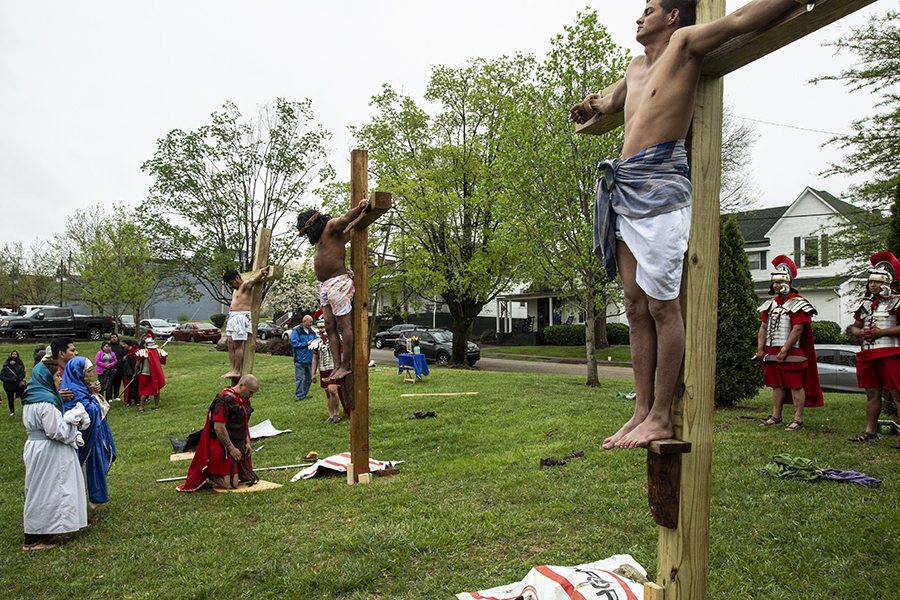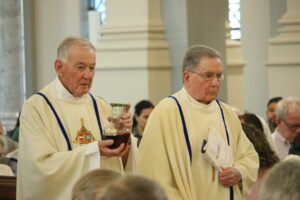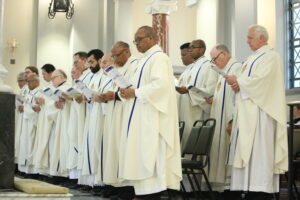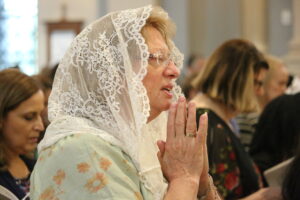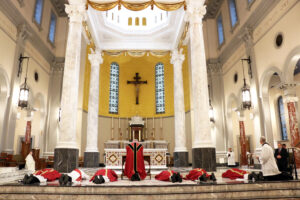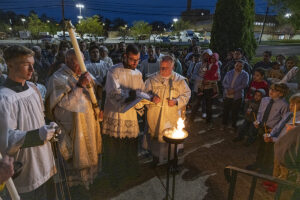Churches across the diocese welcome Eastertide during Holy Week services
By Dan McWilliams
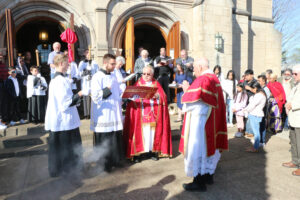
Father Bill McNeeley blesses palms and begins the procession of palms on Palm Sunday at Holy Ghost Church in Knoxville.
The Diocese of Knoxville welcomed nearly 300 people into the Church at Easter Vigil services on April 8, and for those entering at the Cathedral of the Most Sacred Heart of Jesus, Bishop Richard F. Stika saluted their enthusiasm for the faith as a model for longtime Catholics to follow.
“You know, my sisters and brothers, many times I think people who are coming into the Church could put the rest of us to shame, because as adults they began to dig deeper and deeper into those things that we often take for granted: that there is a God, that there is a God who loves us, but there is a Church also that has been given to us so that we might be nourished and that we might grow,” he said at the cathedral’s vigil Mass.
According to the diocesan Office of Christian Formation, some 278 catechumens and candidates entered the Church during Easter Vigil Masses across East Tennessee.
The bishop again presided at the liturgies and services of Holy Week as the faithful filled the cathedral from the Palm Sunday Masses and the Chrism Mass to the Mass of the Lord’s Supper on Holy Thursday and the Good Friday service, and on to the Easter Vigil and Easter Sunday Masses.
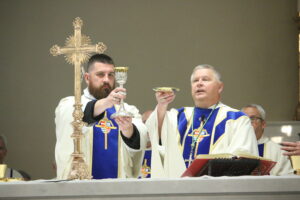
Bishop Stika is assisted at the altar by Deacon Neil Blatchford during the conclusion of the Eucharistic Prayer at the Chrism Mass, which was celebrated April 4 at the Cathedral of the Most Sacred Heart of Jesus.
Chrism Mass
During the annual Tuesday-of-Holy-Week liturgy on April 4, Bishop Stika called it “a great joy for us to gather together as the Diocese of Knoxville to celebrate the Chrism Mass. We gather together with priests of this diocese and deacons, but especially the priests, who will renew their priestly commitments.”
The Mass also is the time when the bishop blesses the holy oils used in the Church throughout the year and consecrates the holy Chrism.
Principal concelebrants of the Chrism Mass were Cardinal Justin Rigali, cathedral rector and vicar general Father David Boettner, vicar general and moderator of the curia Father Doug Owens, episcopal vicar for priests and dean of Five Rivers Father Michael Cummins, and Chattanooga dean Father Michael Nolan. Three diocesan seminarians and soon-to-be priests assisted at Mass. Deacon Andrew Crabtree was deacon of the Word, and Deacons Joseph Austin and Neil Blatchford were deacons of the Eucharist.
More than 55 priests and more than 40 deacons took part in the Mass. Deacon Walt Otey of the cathedral and Deacon Hicks Armor were masters of ceremonies.
This year’s Chrism Mass was a significant one in the life of Bishop Stika.
“I was telling the priests earli er, this is the 15th Chrism Mass that I have been privileged to be able to celebrate here in the diocese, and I look forward to many, many more,” the bishop said.
He began his homily on a somber note as he spoke of the deaths since the previous Chrism Mass of Monsignor Bob Hofstetter, Monsignor Bill Gahagan, and Father Chris Riehl.
“There’s a bit of sadness today, because there are three priests who we have lost throughout the course of this past year,” Bishop Stika said. “Monsignor Bob, who continued to be a pastor at the age of 94, and the parish in Newport still misses him greatly. Monsignor Gahagan, the one priest who seemed to retire every other year, and you know why? Because he loved the people of God. He loved being a priest. And Father Chris Riehl, who died just a few days after his 45th year. His mission was complete, just like Monsignor Bob and just like Monsignor Gahagan.”
But the bishop added a happier note.
“You know, in the month of May, we have a priest who has been living in a retirement home in Nashville, Father Paul Hostettler, who will turn 100 years of age. So, pray for him. I can’t wait to see the candles on that cake,” he said. “We are blessed, as we come together from many different parishes, different places, and different ways of life. I’m so pleased to have the religious and the Knights and Ladies of the Holy Sepulchre here. We celebrate as one Church. We celebrate Jesus, especially during the course of this Holy Week.”
Bishop Stika said that “we are surrounded by simple things.”
“Often those simple things are items that we so often take for granted, and yet those simple things have profound impact on our life. The ability to breathe: my mom suffered for many years with COPD, and I never realized the comfort of a breath without pain or without the ability to know if the next breath would have been her last,” he said. “We all know people who have serious illness, and so often they say, ‘If only I would have . . . .’ Well, life has its moments. But we are surrounded by simple things that can have a profound and powerful message, and especially that one ingredient is words themselves. Just think of the power of the spoken word. If we use it right, we can uplift, we can encourage, but if we use those words in an incorrect way, we can destroy. And for the most part, you can never take those words back. It’s like posting something on the Internet—forever and ever and ever.”
The Chrism Mass was a celebration of words, especially prayers, the bishop said. An ordination of a priest or deacon offers an opportunity for them to say one significant word, he added.
“When my brother priests and deacons were invited to come forward, they spoke a profound word: ‘present.’ And in the course of their ordination, words were spoken and responses were given, that even though in the context of maybe that ritual, of those moments, when we think they are just words, they’re profound,” the bishop said. “The words when the priest gives that absolution . . . those words spoken are profound. The words of our prayers, in which we offer them to God. How often in your life do people come up to you and say, ‘Will you pray for me?’ And it might be a spoken word, or it might be that interior intercession before God. That’s witness; that’s a witness of our faith.”
The renewal of priestly vows, which took place after the homily, offered not only a chance for the Church fathers to recommit to their promises but also a chance for those in the assembly to assure the priests of their prayers for them.
“My brother priests and I and His Eminence will renew our priestly commitment to you, my sisters and brothers, and to all those people you represent in this beautiful diocese, this Catholic Church of East Tennessee,” Bishop Stika said. “Some have renewed those words many times and others just recently. And that’s why this Chrism Mass is so very special, because it’s one of those moments when we come together united in faith, my brother priests and I and the cardinal. That’s why it’s special for us that we should always be at a Chrism Mass until death or until illness, because we’re asking you to pray for us, and we assure you of our prayers.”
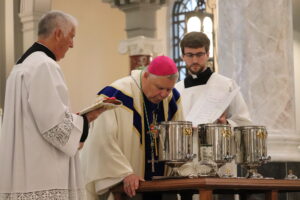
Bishop Richard F. Stika breathes on the sacred chrism during the Chrism Mass at the Cathedral of the Most Sacred Heart of Jesus.
The holy oils blessed at the Chrism Mass also are “very simple,” the bishop said. He noted an exception, that while the other holy oils are blessed by him, the chrism is consecrated by the bishop breathing over it, praying that the Holy Spirit be present in it.
“Oil, not the stuff that Jed Clampett discovered on “The Beverly Hillbillies” or that which keeps the world going, but oil, olive oil,” he said. “It has such a meaning in the Old Testament and in the New Testament. And in May, even the new king of England and his wife will be anointed with chrism, which comes from Jerusalem, the olive trees. And so for us, we present oil to Almighty God, to the Church, that will be used throughout the course of this liturgical year until the next Chrism Mass.
“The oil of the catechumens, which will be used for baptisms. The oil of the sick, in which we can give comfort to people who are facing illness or surgery or whatever it might be. Through this holy anointing, the prayer starts. And then the chrism, olive oil mixed with nard. That fragrance. The other two oils are actually blessed, but the chrism is consecrated as we invoke the Holy Spirit. And that oil will be used for baptisms and confirmations, but also in a few weeks, those three characters over there, Deacon Andrew—pray for him. He just lost his father since his ordination as a deacon. Deacon Neil, whose brother is a priest in the diocese, and Deacon Joseph. For in one moment, after they, too, say ‘present,’ they will present their hands, and I will anoint those hands that later on throughout the course of their life will raise that host and the cup and say, ‘This is my body, this is my blood, given for you.’ That’s why this night is special. The profound impact of the simple nature of oil or the simple nature of words or the simple nature of just witnessing to others that Jesus is the center of our lives.”
That led the bishop to recognize seminarians Bo Beaty, Daniel Herman, and Michael Willey, who will be ordained to the transitional diaconate in June.
“How greatly blessed this diocese is. I’ve already ordained a transitional deacon, Renzo [Alvarado Suarez], who’s currently in Mexico who will be coming to us, God willing and immigration, by the end of this summer,” Bishop Stika said. “Just think of that as we celebrate the priesthood: this diocese over the next two years will have seven new priests. How blessed we are.”
The bishop gave thanks to the assembly at the end of Mass.
“Thank you for being here as we begin in the next days celebrating the gifts that Jesus has given to us: the Eucharist, His death, and His resurrection. Things are exciting here in the diocese as I travel around. We set an all-time record for the Bishop’s Appeal, and collections are up everywhere. Our school population is up everywhere, and vocations—we have a lot of new priests. . . . Things are very good here in the diocese. I’m grateful to my brother priests and deacons but especially this night to my brother priests for all their efforts, because all of the things I just mentioned would not be possible without that. And so I’m grateful to them and for their presence today.”
Bishop Stika also mentioned Cardinal Rigali in his closing remarks.
“To His Eminence, in a week or two he’ll be celebrating his 88th birthday and 62 years as a priest. And in October, we’re going to have a party—he’ll have been a cardinal for 20 years. He has recovered nicely from his illness in January, so it’s always nice to have him here present in our midst,” the bishop said. “But especially to you, my sisters and brothers, thank you, and I pray that you have a very holy and special, joy-filled, grace-filled celebration of Holy Week. God bless you all. To the Sisters . . . thanks for being here. Knights and Ladies of the Holy Sepulchre, seminarians, priests, deacons—anybody who does anything, thank you very much. Especially to the cathedral staff, who always provide us wonderful hospitality. So, blessings of this week.”
During the procession of oils at Mass, Father Michael Woods and Father Tom O’Connell as senior priests received the honor of bringing forward the chrism.
Father Woods was delighted at the opportunity, citing the many diocesan priests who filled that role in the past.
“I carried up the chrism. I have watched I want to say giants who went before me,” he said. “They choose the senior priest, and I’m 57 years ordained this year. To walk in the midst of everybody with the chrism was just such a joy and an honor.”
Father David Carter, rector of the Basilica of Sts. Peter and Paul in Chattanooga and diocesan vice chancellor for canonical affairs, said the Chrism Mass celebrated the brotherhood that priests join when they are ordained.
“This is the time when we all get to come and celebrate together the common ministerial priesthood that we have. That’s why it’s so special for us to do that every year, and especially as we do the thing that is the heart and soul of our call, to walk with Jesus in His passion, death, and resurrection, and then proclaim Jesus Christ risen through these Holy Week liturgies,” he said.
The Chrism Mass traditionally occurs on Holy Thursday but is moved for convenience to Tuesday, Father Carter noted. Its Holy Thursday significance, on the day Christ instituted the priesthood, is connected with the mandatum, the washing of the feet on that day, he said.
The novum mandatum, the new commandment, the washing of the feet, is a “commandment to love one another and to be of service, and that’s the essence of the priesthood: to serve the people of God,” Father Carter said.
Rosemary Calvert, a parishioner of St. John Neumann in Farragut, praised the Chrism Mass and the great number of priests and deacons taking part.
“The Holy Spirit is working in everyone, and it’s beautiful to see all of our priests and deacons in force and [the priests] renewing their vows,” she said. “It was an amazing number, and all standing up and celebrating the Mass at the same time is pretty powerful.”
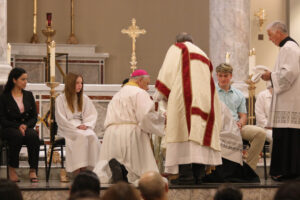
Bishop Stika washes the feet of faithful at Sacred Heart Cathedral during the Holy Thursday service.
Holy Thursday
Bishop Stika opened his homily on Holy Thursday by assuring those who by virtue of their human nature tend to worry. He said that members of religious communities and Catholics throughout the globe are praying for them.
“Maybe you think, ‘Does anyone ever really care?’ Well, let me give you this assurance: right now, in this world, there are many people who are praying for you. They might not have ever seen you. They might not know your name. They might not even know what your difficulty might be or your joy. But I know this for a fact,” he said.
During his days in St. Louis, Bishop Stika served for 10 years as chaplain for the Carmelite cloistered Sisters, one of nine such communities in his home archdiocese. He also knew the city’s “Pink Sisters,” the Holy Spirit Adoration Sisters, are recognized for their rose-colored habits.
“They became very famous when it was announced that St. John Paul II was coming to St. Louis in January [1999]. When I was interviewed by the media, they asked, ‘Are you worried about the weather?’ I said, ‘No, because I’ve got the Pink Sisters praying about it,’” the bishop recalled. “After that, the amount of prayers that came to the Sisters was enormous. There are people 24 hours a day, seven days a week, who kneel before the Blessed Sacrament. They pray for individuals, pray for nations, who kneel in adoration and prayer. That is a great consolation. In our own diocese, we have the Handmaids of the Precious Blood, a cloistered monastery in New Market, Tenn., who pray for priests throughout the world, to give us consolation, too, as we celebrate the priesthood this evening.”
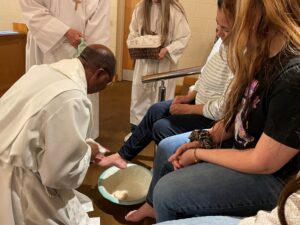
Father Bart Okere washes the feet of the faithful at St. Henry Church in Rogersville on Holy Thursday.
Christ, being the Son of God, “knew the frailties of our human existence,” Bishop Stika said. “And His Father promised the Holy Spirit to inspire us, to carry us, to give us that push in our lives when we listen to the invitation of Jesus to build His kingdom, a message that sometimes is ignored or misunderstood.”
Jesus had prayed in the Garden of Gethsemane to “let this cup pass from me, but your will be done not mine,” the bishop said.
The Savior celebrated the Last Supper as a Passover meal, knowing what was to come for Him, Bishop Stika said.
“He broke the bread and gave it to His friends, His disciples, and He said, ‘Take this all of you and eat it. This is my body.’ He didn’t say, ‘This is a representation of my body’ or ‘this is a symbol of my body.’ He said, ‘This is my body, given for you.’ And He took the chalice—the same thing: ‘This is my blood, given for you. Do this in memory of me.’ And for centuries, day in and day out, in monasteries and great cathedrals, wherever it might be, it’s the same situation that we celebrate today.”
The bishop referred to the mandatum of Holy Thursday.
“It’s a symbol of charity, for when Jesus said, ‘Whatever you do to the least of my brothers and sisters, you do for me.’ And so, what’s the symbolism? The cleansing or washing of feet,” he said.
Bishop Stika washed the feet of parishioners after the homily. At the end of Mass, there was no final blessing as the altar was stripped in preparation for Good Friday.
Jesus chided his Apostles for sleeping in the garden, for not “waiting for me” even “for one hour,” the bishop said. “That’s the development of what came to be the holy hour, to spend time with Jesus…. Spending time with Jesus. Bring to Him your worries, your sins, your joys, your sorrows—bring with you people who have asked you to pray for them.” The bishop then concluded: “The rest is history. ‘Father, it is finished. Into your hands I commend my spirit.’”
Good Friday
The Good Friday service began with a narration of the Passion of Christ, with responses by Bishop Stika and those in the assembly. In his homily, the bishop opened with a question about the word for the day: “good.”
“Let’s dig a little deeper on this Good Friday. What happened? One of the Twelve, whom Jesus chose, betrayed Jesus, sold Him for 30 pieces of silver. Why? All kinds of reasons, I guess. Eventually, he saw the horrible nature of his deed, and he was willing to give the money back, but then it was too late, and he took his own life. Does that give us something ‘good’? Peter, the impetuous leader of the Apostles, eventually the one chosen by Jesus to lead the Church, as Francis is today, a successor of Peter. ‘I don’t know the man. I have no idea who He is.’ Three times. Is that ‘good’? The Apostles, those who walked with Jesus and listened to Jesus and saw the miracles, how Jesus brought them into His own life and into the life of His Mother—they scattered. Is that ‘good’? The crucifixion, when just John, the youngest, and Mary Magdalene, and some others watched Jesus’ life leave His body. In His last hours, He was tortured beyond belief. His hands and feet were nailed to a wood cross, huge nails, painful, a spear in His side. Was that ‘good’? But you know, in some ways, maybe God has a way to make lemonade out of lemons, as they say.”
But there was good on the original Good Friday, Bishop Stika said.
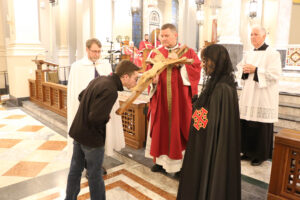
Veneration of the Cross with Father David Boettner during Good Friday Mass at Sacred Heart Cathedral.
“Veronica, one of those followers of Jesus, when she saw Him carry the cross, thump-thump-thump, over those steps, took a cloth and pressed it against His face, and His image appeared on that cloth. That was ‘good.’ Simon the Cyrenian, minding his own business, either was volunteered or volunteered, who knows, to bear that heavy, heavy cross, even though maybe some people thought he was the criminal as he bore that heavy cross to Golgotha. The women of Jerusalem who cried for Jesus, is that ‘good’? Yes, for they were sad. The centurion: ‘Truly this man is the Son of God.’ A statement of faith. That was good.”
The good thief crucified with Jesus told Him: “‘Jesus, remember me when you come into your kingdom.’ A statement of faith,” the bishop said. “Maybe he never met Jesus, maybe never knew who He was, but he said to Jesus, ‘Remember me when You come into Your kingdom.’ A thief, a murderer, we don’t know his crime, and the one person who is assured to go to heaven: ‘this day, you will be with me in paradise.’ And that was good. Joseph of Arimathea. Tradition tells us he was a wealthy man, and he had a tomb that was unused, and he gave it to Jesus to use, a tomb normally for wealthy people. That was good.”
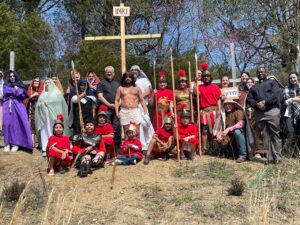
Father Michael Cummins and Father Emmanuel Massawe, AJ, are shown with reenactors in the Living Stations of the Cross at St. Dominic Church in Kingsport.
Good Friday “reminds us that one man died for all, and His name was Jesus. He was the son of Mary and Joseph, and that was good. . . .,” the bishop said. “We exalt the cross. We have crosses in our churches, crucifixes. We make the sign of the cross, a reminder that this one man died so that our sins, the sins of the world, can be forgiven, that we might know the love and the embrace of the Father, that eventually we might feel the presence of the Holy Spirit. This one act, this torturous act of Jesus for each and every one of us, and that is good. He died for us.”
The Church’s teaching of redemptive suffering also is important to remember on Good Friday, Bishop Stika said.
“When I suffer or you suffer or someone suffers, if they combine it with the sufferings of Jesus on that cross, it makes a difference. It gives it meaning,” he said. “It won’t let the pain go away necessarily, but it gives it meaning. We all carry crosses, not the cross like Jesus carried. We’re not nailed to it like Jesus was, but many times our crosses are heavy. It might be disease or age or confusion or disappointment, and it can overwhelm us and overtake us and allow us to feel miserable about ourselves, and yet if we remember that phrase ‘redemptive suffering,’ it can give it meaning.”
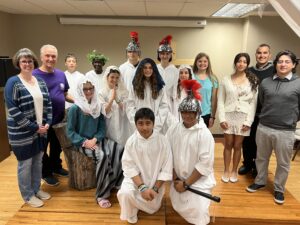
Father Peter Iorio is shown with reenactors in the Living Stations of the Cross at Our Lady of Fatima Church in Alcoa.
The bishop, referring to a Sister he knew in St. Louis, Sister Marian Joseph of the Dominican Sisters of Sparkill, said, “I’m sure she told me at some point, ‘offer it up.’ It makes it redemptive. It makes it just like Jesus, who was willing to die, innocent as He was, for all of us. So, maybe we could make that a practice of our life, to not allow confusion or pain or uncertainty to overtake us, those crosses of life, because they’re inevitable. But there are people willing, like Simon, to help us carry that cross, not all the time. Many times we don’t share what that cross might be in our life. We can let it grind away at who we are. So, today we can call this day many names, but I think this day reminds us of the redemptive suffering that we all can bear and offer it up for another person. Give that as a gift.”
Deacon Walt Otey led the solemn intercessions at the Good Friday service, telling the congregation to stand and kneel as he did so.
The service concluded with the veneration of the cross as each member of the assembly came forward to kneel and kiss the crucifix, held by Father Boettner, cathedral associate pastors Father Martin Gladysz and Father Jhon Mario Garcia, Deacons Mike Mescall, Fredy Vargas, and Neil Blatchford, acolyte Jerry Bodie, and others. “Behold the wood of the cross, on which is hung the body of our Savior. Come let us adore,” the bishop said.
Easter Vigil
At Masses on the night before Easter throughout the diocese, the Church welcomed its newcomers: the catechumens, who were baptized, confirmed, and received their first Holy Communion, and the candidates, who were confirmed and received their first Holy Communion.
Bishop Stika started his homily at the cathedral by speaking of the universe and its constant expansion into nothingness since God gave it a “spark.”
“The only way my mind can picture it is a hand, the hand of God, who extends His hand out with that spark,” the bishop said. “You see, the authors of Genesis were trying to explain things, like all of us, in their humanity. Why are there more fish in the sea? Why is there a sky? Why does it rain? Why does it get dark? Why? And so they were trying to place it all together, but also I believe God instilled in them a sense of some answers. . . . Genesis tells us there is a Creator. And the other readings remind us that God interacts with His people, through prophets of the human condition, through sinful people like David and Solomon, through doubters like Moses. But God continues to act.”
The bishop assured the newcomers to the Church and the others assembled in the cathedral that Jesus’ existence is confirmed by not only the biblical accounts but also by other writers of the Roman Empire.
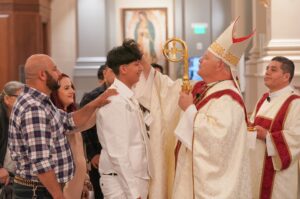
Bishop Richard F. Stika confirms a young man during Easter Vigil who is entering the Catholic faith. Assisting the bishop is Deacon Fredy Vargas.
“This miracle worker, this prophet, this rabbi, this rabble-rouser. He existed. We know by faith and also by oral tradition that He was born in Bethlehem, the city of David, that His Mother was Mary. The man who taught Him how to be a man, to love Him and to love His Mother, was Joseph. And eventually there He was at the age of 30. He was a miracle worker. There are historical accounts of this written by the Romans and such. And at one moment, He was a threat, a threat to the Romans, a threat to the establishment of the Jewish people around Jerusalem. Then He died. And then He was raised by the Father, and here today are we.”
Jesus, knowing the human condition, realized that “people could stray and be frightened . . . and be hungry for something greater than food. He gave us the Eucharist. ‘This is my body’—we just heard those words a few days ago as we celebrated the Mass of the Lord’s Supper—‘this is my blood, given for you. Do this in memory of me,’” the bishop said. “Share it. Share the Word. Share the Old Testament, the Jewish scriptures, the birth of the Church at Pentecost.
“Today is a very special night for the Church throughout the world, in big cities and small villages, in private homes and great cathedrals. And in this cathedral . . . we welcome brothers and sisters of life into our Church through baptism, reception into the Church so that they might receive the Eucharist. Confirmation, again invoking the Holy Spirit—it’s historic.”
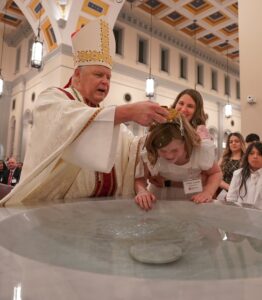
Bishop Stika baptizes a young catechumen as her sponsor and family offer support during the Easter Vigil at the Cathedral of the Most Sacred Heart of Jesus on April 8.
Bishop Stika reminded the newcomers of his Rite of Election statement at the beginning of Lent, that those looking for the “perfect Church” must realize that “as soon as you join it, it’s not so perfect.”
“Remember? Nobody walked out on me when I said that because that’s true for all of us. Pope Francis tells us that the Church is like a hospital for sinners or a school for saints, as weak and as sinful that we are. We have just celebrated the death of Jesus so that we might triumph over our sins, so that we might know mercy and forgiveness, so that we might be strengthened by the Eucharist, and also that we might witness to others, and all of a sudden they wish to join us at the eucharistic table, to hear the body and blood of Our Lord is given for us for our nourishment, for our strength, and let that never be ordinary for any of us or mundane,” the bishop said.
“So, to all of you who are joining the Church today, I see hope. You’re entering into an imperfect institution that has been elevated because as St. Paul tells us, we are the body of Christ. We are the members, and Christ is the head. Stay close to Jesus. Don’t think that once you join us you don’t have to continue to study because every day more and more can be opened to us through prayer and study and witness so that we might discover more and more the beauty as a child of God and a follower of Jesus. In a few moments, we’ll celebrate baptism, confirmation, and reception into the Church. And then all of us again will renew our own baptismal promises that we make year in and year out, that probably were made for most of us when we were baptized as little children,” he concluded.

